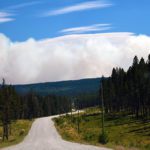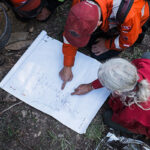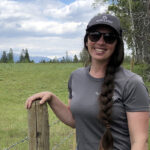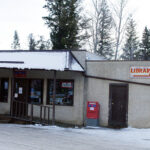Home »

Witness: a modern spiritualist’s life adventure
By Ian Cobb/e-KNOW
You wonder why someone would name a book “Witness – Voices and Choices.”
It is a title that sat at the front of my mind as I began to read Jiri (George) Horak’s biography – Witness – Voices and Choices.
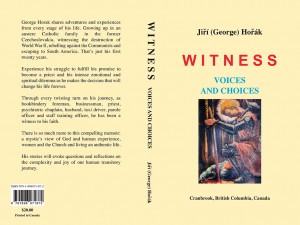
Prior to holding this book in my hand and before meeting book editor and George’s friend Douglas Mitchell, I had never heard of the author before. I’ve never read a biography about someone who wasn’t ‘famous’ for one reason or another.
But Douglas’ words about his friend – with love, with soul and with passion of conviction – captivated me and I met with them on a cold February morning in Cranbrook, to meet George and to hear his story in his own words.
A lover of history, I always find it utterly fascinating to speak with people who have lived history. While we all live history is the most accurate of statements, some of us live it more.

Such is the case with Jiri Horak (Jiri is Czech for George).
Born in 1929, Jiri was in Grade 4 when Adolph Hitler’s Nazi Germany invaded his homeland, Czechoslovakia in 1938. One of the great pre-cursers to the start of the Second World War involved the Nazis rolling into Czechoslovakia, seeking to reclaim the Sudetenland, in the northwest of the nation.
By 1939, the entire country had been taken over by the Germans.

“We gave up without a shot,” George recalls, noting (British Prime Minister Neville) Chamberlain and the French government as “traitors.”
In the book, he recounts his childhood briefly, introducing his parents and brother Joe, who at the age of 19 would be sentenced for espionage by the Communist government and spend four years in a uranium mine controlled by the Soviet Union, and we meet his sister Margaret.
George and his siblings were children in a nation occupied by Nazi Germany – on a continent about to be squeezed by the throat by war.
“The fear of the Gestapo, of the concentration camps and executions of Czech patriots became common. Every school classroom had a picture of Hitler on the front wall. The father of one of my classmates was executed. Many Czechoslovak military officers suffered the same fate,” George remembered.
By 1940, things got even worse for his family, as his siblings contracted scarlet fever and his father was hospitalized after an accident.
“There was no insurance; hunger, cold and depression filled our small apartment,” George noted.
Shortly after, George’s life course received another major correction when his left femur was crushed while he attempted to help a farmer right a tipped-over sleigh. Numerous surgeries would follow and George’s left leg would cause him grief moving forward, though he never let it him stop him doing what he needed to do.
“Three years after the accident I was skating again. I even played hockey,” he recalled.
At 14, George entered the workforce and eventually became an able bookbinder, a skill that would serve him well later on.
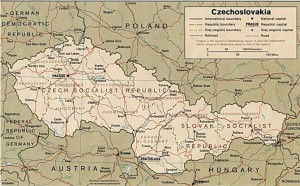 Eventually, the Soviets pushed the Germans from Czechoslovakia and George took it all in.
Eventually, the Soviets pushed the Germans from Czechoslovakia and George took it all in.
“In a strange way I enjoyed witnessing the war theatre. I got involved whenever I could. When most people were hiding in their cellars, I was out days and nights too. In all that horror there was also beauty: the flaming tails of the flying rockets, the thunder of cannons, the rosaries of shining bullets at night, the bombs on the blue sky falling on the Brno airport in the morning sun; planes shot down and pilots parachuting.
“On one occasion six Messerschmitt (German Luftwaffe fighters) met with six Russian fighter planes right over my head. A spectacular short dogfight followed. It was a show, and yet, not a show; it was real. Their machine guns were drumming and the planes were performing acrobatics for a minute or so – then it was over. Both sides returned into the formations in which they had arrived and continued on their way home. Russians to the south and Germans to the north. One of the Messerschmitts started to smoke and suddenly dropped like a stone from the sky. The pilot parachuted, his plane landing less than 150 metres from where I stood,” George writes.
What should have been jubilation from the removal of the Nazis became a ‘meet the new boss same as the old boss’ situation as Czechs now found themselves behind the Soviet Iron Curtain.
George was more concerned about being a good Boy Scout at the time and was enjoying theatre performance, where he experienced his first Communist brainwashing endeavor.
“We realized that we were in trouble. We had not done anything wrong, but it was obvious that the Community Party did not like the Scouting ideal of self-reliance and independence,” he recalls.
By 1947, George’s life would take a turn toward the spiritual, a turn that would engulf him to this day.
Initially, he agreed to attend a church retreat at the bequest of his father.
“Actually, I did not know what a retreat was about, except that it was something churchy,” he states.
It was his introduction to Jesuits and he soon experienced “a cornerstone spiritual experience that is alive in me to this day.”
George decided to enter the priesthood.
“The decision was made and I stuck to it. I entered into the darkness of my future. “Here I am, Lord!” He recounted.
Being a practicing Catholic in a Communist-ruled, iron-fisted society was not the ideal situation. Striving to become a priest in such an environment was another matter entirely.
George refused to work Sundays and started to draw the ire of the Communists. Soon, it became apparent that George would have to leave Czechoslovakia if he wanted to continue down the path to priesthood, leading to a host of life-altering characters and experiences.

“I feared the State Security (STB), the Communist Police. I considered them my personal enemies. On two occasions they arrested me and twice they let me go,” George notes, adding he realized much later in life, while working as a Probation and Parole Officer in Ontario, that he released in order to possibly lead police to other individuals.
Working with underground networks and experiencing close calls with Communist authority eventually led George to a night flight over the Czechoslovak border – through the Dyje River – to Austria.
Once in Austria, George and the 10 other people he fled with were still not safe, having to first clear a Soviet-controlled buffer zone.
A truck was arranged to take them to Vienna – where freedom awaited. George lay in the back of the truck with the others, covered in canvas and boxes.
“Suddenly the truck stopped and we heard Russian mixed with German. A Red Army patrol had stopped us. I hoped that Franta with his automatic folded assault rifle under his jacket would not lose his nerve and start shooting. He was sitting in the front seat with the driver. He kept cool and cooperated when the Russian soldiers ordered them out of the truck. They opened the canvas of the truck and started to remove the empty boxes. I stopped breathing and I’m sure everyone else did, too.”
The soldiers did not find them.
Franta, a man who led them to freedom, would later be caught by police and take his own life rather than be arrested.
George, who turned 85 in April, doesn’t believe things have changed that much in the world, even though the Soviet regime failed.
“The Communist ideal of one government over the whole world is as alive today as it ever was, except it is no longer Communist. The idea of one world government seems to make sense. Man’s self-centered nature of using his intelligence for selfish purposes in the name of noble ideals remains the same today,” he states.
The uncertainty and restrictions of Nazi and Soviet oppression behind him, George dived into his religious studies but freedom stayed away and the Cold War was in full chill.
Emigration became an option – to one of Canada, Australia or Venezuela. As George is now a resident of Joseph Creek Village in Cranbrook and has spent the past 52 years in Canada, you’d think he ended up here.
But he ended up in Venezuela in 1951, where his book-binding skills would serve him well, and he applied to a seminary in Caracas, still striving to become a priest. Failure to enter that seminary eventually led George back to Europe – to Rome, where he spent five years, becoming ordained in 1958 at the Lateran Basilica, possessing a Prolyta ‘Cum Laude,’ essentially a master’s degree in theology.
George arrived in Canada in 1962 – at Montreal’s Dorval Airport.
“Canada became my destiny, a better destiny than I could have imagined. Little did I know how my life would change, how differently my priestly ministry would be,” he said.
Love of God soon found a challenge in the love of a woman and George’s path took several sharp turns, leading him, married and content, to Cranbrook.
To attempt to explain or illustrate those paths would be futile in such short space, whereas reading the book provides a worthwhile and fascinating glimpse into the life of a mystical, wise human being.
“Amazing – that’s Canada,” George told me as he recounted his arrival.
Leaving the church for his wife Vera was a painful experience, he said, pointing out he was labeled a traitor.
Douglas Mitchell interjected, “It was really hard to edit that. The pain and anguish came through,” he said.
That said, George has always been a spiritual person and always will be, he said.
“All the things he witnessed… I think this is a spiritual story,” he said, recalling he first realized George had a powerful story to relate after he drove him to a hospital in Calgary.
“I knew this wasn’t just some fellow who just worked as a book-binder,” he chuckled.
That drive led to a labour of love that lasted two years, concluding with the publishing of the book late in 2013.
“It was a kind of therapy for me,” George said. “Some of it was quite painful.”
Mitchell eloquently sums him in his introduction to the story. “He has listened to the voice of God, listened to the voice of his conscience, made choices and accepted the consequences without bitterness or regret. He has remained a faithful witness through his 84-year journey.”
By the time you turn away from page 303, there is no question as to the name of the book. Jiri Horak has been a witness to the wonderment of life and its myriad of spells and within it he experienced a sweeping saga defining our age – with love, with soul and with passion of conviction, all moved along by voices and choices.

Witness – Voices and Choices was printed in November 2013 by St. Peter’s Press in Muenster, Sask. It is available for sale at local stores such as Lotus Books and Coles.
